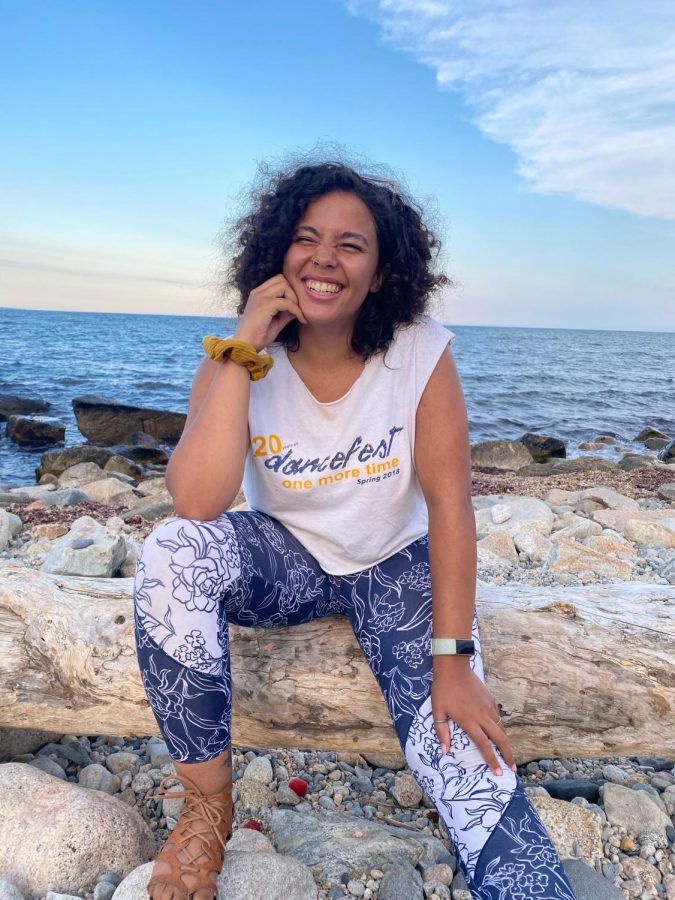Dani Robinson: Revitalizing Education
Dani Robinson, a senior concentrating in educational studies with a minor in film and media studies, happily explained her interests in teaching high school social studies.
“It’s important to combat dominant narratives,” Robinson expounded. “What does it mean that we see ourselves as a nation of immigrants, yet we exclude people of color all the time? … Why do we still think of people of color as foreigners when they’ve been here for hundreds of years? … We need to revitalize education; we need something new. We’re looking at high school social studies, just because understanding people and culture in a broad sense is so important.”
For Robinson, the purpose of her education is to give back to others that aided her along the way and to further supply resources to those that need them most, such as those with disabilities or otherwise marginalized groups that society tends to overlook. Taking full advantage of her liberal arts education, Robinson has explored many courses that further flesh out her aspirations in education, such as multiple history courses concerned with immigration and African American history. She also expressed her love for the educational studies department, purporting the benefits of pursuing coursework that provides new and paradigm-shifting ideas as they apply to standardized education and accessibility.
“I could talk about [the educational studies department] all day long … They’re a very understanding group, and the things that we study are really interesting — for example, I’m doing a feminist disability course right now, and it’s changed my view on what ‘disability’ is. We always see [disabilities] as an individual problem, but in reality, it’s a societal lack of access to resources. If we had the access to, for example, wheelchair ramps and other such structures to support those with disabilities, we wouldn’t see them as something out of the blue, something we can’t fix. Think about how common glasses are; we hardly even think about poor eyesight, and that’s because of the resources available to help those in need.”
Outside of her involvement in the educational studies department, Robinson has a long history of caring for and helping others. An active member of Delta Delta Delta, she regularly participates in the philanthropy events that the organization hosts. When she spends time at home in Rhode Island, she works at a daycare for young children and infants. When asked why she wanted to teach high schoolers and not children, Robinson highlighted the importance of challenging the status quo and forcing the development of independent thought that is only possible in a high school classroom.
“[High schoolers] still have such open minds, but there’s so many complex things they can learn and form their own opinions about. You can really dive into alternative histories, and it’s like, ‘You should know about these facts before going to college.’ My classes in the educational studies department challenge me in a similar way and make me ask questions like ‘How could I teach this lesson?’ … ‘How would I communicate this to my students?’ [The current precedent of social studies] is a problem for me, because I’m Native American, and the current dominant history is that once the settlers arrived, we all contracted diseases and disappeared, and we know that now to not be the entire case at all,” Robinson said. “I’m still here.”
Robinson emphasized the importance of having conversations about alternative histories early in education, explaining that issues are not as clear-cut as one might assume. Additionally, discussing alternative histories allows for further conversations about our history today and how we may seek to rectify societal injustices and inequalities. In some ways, Robinson explained, universities like Colgate would greatly benefit from being frank and transparent in their dealings with events of racism on campus — teaching students to be open to understanding history in its entirety would aid both classroom and administrative discussions, which Robinson feels is a necessity insofar as the university tends to fall short in tackling such events.
“I feel like the university tries, but their actions combat that at times. They don’t actually put in the effort; consider the racist events that have happened while we’ve been here — they become big for a month and there’s all this talk, and then nothing happens. The problem is not that we forget about it — we don’t — the issue is that we don’t recognize the micro-aggressions that occur on this campus all the time until something big happens. I know the school wants to help out, but I feel like overall, what they say doesn’t match their actions.
This being said, Robinson greatly enjoys Colgate and sees the institution as something that is willing and ready to change for the better. With support from students to push for new and appropriate action, Robinson concludes that Colgate can tackle not only events from the past but also events as they currently happen on campus in productive and forward-thinking ways.
Miller Downer is a senior from Natchez, Mississippi concentrating in environmental biology and English. He's previously served as an assistant commentary...




